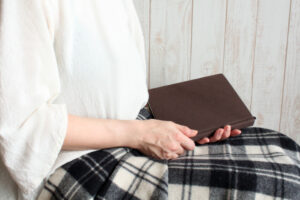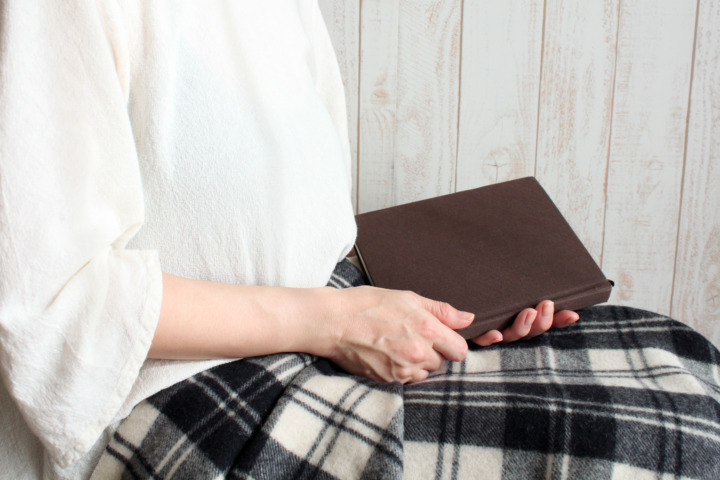Lotz compares that experience to how she approaches Bible reading each and every day. “When I get up in the morning and spend time with the Lord, it’s like setting my compass, so that regardless of which way I’m turned during the day, the needle turns north,” Lotz said. “My thoughts, my attention, they’re centered on the Lord.[/toggle]
アン・グレアム・ロッツは幼いとき、友人と山登りをするのが好きだった。ある日、帰り道を見失ってしまい、いつの間にか森の深みに迷い込んでしまったことがある。
「ブルーリッジ山には広大な月桂樹の森があって、迷うと大変なんです。空も見えないし、周りを見渡せるようなところもなくて」と、ロッツは振り返る。
幸いにも、その友人はコンパスを持っており、北を目指して歩いて森を抜け出すことが出来た。
「もと来た道を見つけて、帰ることができたんです。それでなんとかなりました。」
その経験は、現在の彼女がもっている毎日聖書を読む時間に近い感覚をもっていると言う。
「朝起きて、神様と過ごす時間。それはコンパスを手に取るのに似ています。どのような道であれ北を目指す、というのと同じように、毎朝聖書を読む時間は、一日を始める私にとって神様に集中を向けるための時間なんです。」
聖書を読む時間は女性の方が多い ―Women Lead in Scripture Engagement―
[toggle]Lotz’s commitment to daily time in the Word reflects the Bible engagement habits of many American women. The Pew Research Center’s Religious Landscape Study reports that among evangelical Protestants, 66 percent of women read Scripture at least once a week, compared to 58 percent of men. While these Bible-reading habits may involve engaging with Scripture during a church service or midweek Bible study, women also outpace men when it comes to engaging with Scripture outside of church. According to the 2017 Baylor Religion Survey, 36 percent of Christian women spend weekly or daily time alone reading the Bible, compared to 29 percent of Christian men.The 2020 State of the Bible survey, commissioned by the American Bible Society (ABS) and conducted by Barna, also finds that “women are more Scripture engaged than men.” It reports that more than half of American women (52%) are “Bible friendly,” “Bible engaged,” or “Bible centered,” compared to 47 percent of American men. The researchers used the term “Bible friendly” to describe those who “interact with the Bible consistently” and may consider it “a source of spiritual insight and wisdom.” The term “Bible engaged” described those who “interact with the Bible frequently … transforming their relationship with God and others.” Finally, “Bible centered” described those whose frequent interaction with Scripture transformed not just their relationships but also their choices.
The ABS report also notes that African Americans “are more Scripture engaged than other racial or ethnic groups.” Among black Christians, Pew reports a similar gender difference: 64 percent of black Christian women read the Bible at least once a week, compared to 56 percent of black Christian men.
So why are women leading in the area of Bible engagement? While the studies from Pew and the American Bible Society do not directly address the definitive cause of these findings, other research, bolstered by observations from key female Bible study authors, points toward possible sociological, cultural, and ecclesial reasons.[/toggle]
聖書に毎日向き合うのはロッツだけではなく、アメリカ人女性全般に広く見られる習慣だ。
ピュー研究所(米調査会社)の調べでは、福音派では66%の女性が「少なくとも週に一度は聖書を開く」と答えている。(男性は58%)
これが礼拝での聖書朗読や、週の半ばに行われるバイブルスタディ(聖書学習会)への参加率などに関係している可能性もあるが、教会の外に限っても、女性は男性よりも多く聖書を読んでいる。
2017ベイラー大学の宗教調査によると、クリスチャン女性の36%が「毎週あるいは毎日一人で聖書を読む時間を持っている」と答えた。(クリスチャン男性は29%)
アメリカ聖書協会(ABS)の主催で、調査団体バルナが実施した2020年聖書調査でも「女性の方が聖書を読む時間が多い」という結果が出ており、半数以上となる52%のアメリカ人女性が「聖書に慣れ親しんでいる」「聖書を読むことにコミットしている」「聖書を中心に生活している」と答えている。(男性は47%)
「聖書に慣れ親しんでいる」という定義について研究者は「日常的に聖書を読み、霊的な知恵と想いをもたらす源だと捉えている」と説明し「聖書を読むことにコミットしている」の定義については「頻繁に聖書を読み、それによって神や人々との関係性を変えられている」としている。
また、「聖書を中心に生活している」 については「聖書を読むことで様々な関係性が変えられるだけではなく、自分がどのような選択をするかにも大きな影響がある」と定義づけられている。同統計ではアフリカ系アメリカ人のほうが「他の人種よりも多く聖書を読んでいる」という結果も出ている。ピュー研究所の調査では、黒人クリスチャン女性のうち64%が「聖書を一週間に最低一度」は読んでおり、全体の統計同様、性別間の違いがあることが報告されている。(黒人クリスチャン男性は56%)
女性の方が聖書を読む時間が多いのは何故だろうか?ピュー研究所やアメリカ聖書協会の統計報告はその理由について明確に言及していないが、バイブルスタディ関連で著名な女性ライターたちは、社会、文化、教会の状況にその理由があるのではないか、と指摘している。
読書習慣の違い -Differences in Reading Habits-
[toggle]“More women read, for one thing,” said Sandra Glahn, a Dallas Theological Seminary professor and Bible study author, when asked about the elevated rate of Bible engagement among women. “We’ve known that for a long time. There are lots of theories as to why, but more women are buying books of any kind.”Generally speaking, women and girls do tend to read more than men and boys. According to “Gender Differences in Reading and Writing Achievement” in American Psychologist, females read more than males in almost every developed country. From girlhood, females also read more thoroughly and have greater reading comprehension than males. Although most gender differences in cognitive abilities are considered small, trivial, or statistically insignificant, the difference in reading achievement “exceeds the threshold for non-trivial gender-difference effect sizes.” In simpler terms, the differences in language and reading between men and women are large enough to be significant and meaningful. Habits of frequent and thorough reading that women bring to other texts are likely an influential factor in women’s Scripture engagement.
Although some business experts suggest that flexible work schedules are the future of employment for both men and women, women have long prioritized flexibility in order to balance work and family life. Jackie Hill Perry, author of Gay Girl, Good God and a recent LifeWay Bible study on the Book of Jude, said, “It isn’t that women have more time—but I think women have more time at home.” Whether women are working from home or homeschooling, Perry believes this time at home and flexibility in daily schedule provides some women with more opportunities to dig into the Scriptures.[/toggle]
「そもそも、女性には読書を好む人が多いのです」と語るのはダラス神学校で聖書学の教鞭をとるサンドラ・グラーン氏だ。
「私たちの間では、昔から分かっていたことでした。その理由については様々な仮説が出ていますが、種類を問わず、本を買う割合は女性の方が高いのです。」
一般的に言って、女性は男性より多く本を読む傾向がある。アメリカの心理学会が「読み書き能力の性による違い」について調べたところによると、ほとんどすべての先進国では女性のほうが男性よりも文字を読む時間が長い。
年齢の低い段階でも、女性は文章全体を読む力、また読解力において男性よりも勝っている。性別による認知能力全体の違いで言えば些細な違い、あるいは統計上の誤差程度の違いしかないが、読解力に関しては「微々たる違いとは言えないほどの違い」が性別間で見られるという。
簡単に言えば、男女間の言語理解度、あるいは読む力の違いは十分特筆に値する、ということだ。
文章をより深く、多く読む傾向があることは、女性が聖書を多く読む理由にも大きく関わっているだろう。
